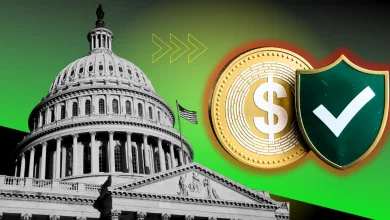
Senator Warren's "Digital Asset Anti-Money Laundering Act" proposes stricter regulations for cryptocurrencies.
The bill faces opposition from the crypto community, who argue it could stifle innovation and privacy.
The industry is divided and the bill's fate is uncertain, with the crypto markets watching closely.
Senator Elizabeth Warren’s latest push for the “Digital Asset Anti-Money Laundering Act” has drawn attention and backing from five fellow senators, expanding the bill’s co-sponsorship. This legislation seeks to apply stringent Bank Secrecy Act guidelines, encompassing know-your-customer (KYC) protocols, to various crypto entities, indicating a stride towards comprehensive regulatory oversight within the crypto sphere.
The news had a clear impact on the crypto market, causing a 5% drop in Bitcoin prices just before Warren unveiled her crypto “crackdown” bill. Bitcoin, which had seen eight weeks of gains, took a hit and fell to $41,000.
Warren’s Legislative Journey
Despite the potential importance of the bill, there’s skepticism, given Warren’s history of struggling to turn bills into laws. Over 11 years, she introduced an impressive 330 bills, but only one—the National POW/MIA Flag Act—made it into law.
It’s essential to note that most legislators face challenges in getting their bills passed, and many proposed laws never become reality. Warren’s Digital Asset Anti-Money Laundering Act resurfaced in July, aiming to tighten regulations by designating crypto apps and corporations as Bank Secrecy Act-regulated financial institutions.
Concerns from the Crypto Community
However, Warren’s proposal is facing strong opposition within the crypto sector. Critics say the bill, if enforced, could seriously impact the existence of cryptocurrencies in the U.S. by placing challenging know-your-customer (KYC) requirements on decentralized entities like wallet providers and miners.
Well-known figures in the crypto world, like Alex Thorn from Galaxy Research and Neeraj Agrawal from Coin Center, have raised alarms. Thorn called the bill a potential “effective ban” on Bitcoin and crypto, highlighting the mismatch between decentralized software and centralized compliance functions. Agrawal expressed worries about hindering innovation and eroding personal privacy, despite the bill’s goal of curbing illicit financial activities.
Twitter has become a platform for public skepticism, with users questioning based on Warren’s historical track record.
While others called her a corrupt and manipulative like Gary Gensler.
The Industry is Divided
In this divided landscape, the bill faces challenges within the Senate, where support for crypto legislation is split. House Financial Services Committee member Patrick McHenry has hinted at potential compromises between the House and Senate on anti-money laundering rules in the crypto space. Talks persist, even as McHenry’s term is ending, to speed up the stabilization of crypto rules.
As the crypto community braces for potential changes, the fate of Senator Warren’s “Digital Asset Anti-Money Laundering Act” is uncertain, with the crypto markets closely watching the unfolding legislative drama.








